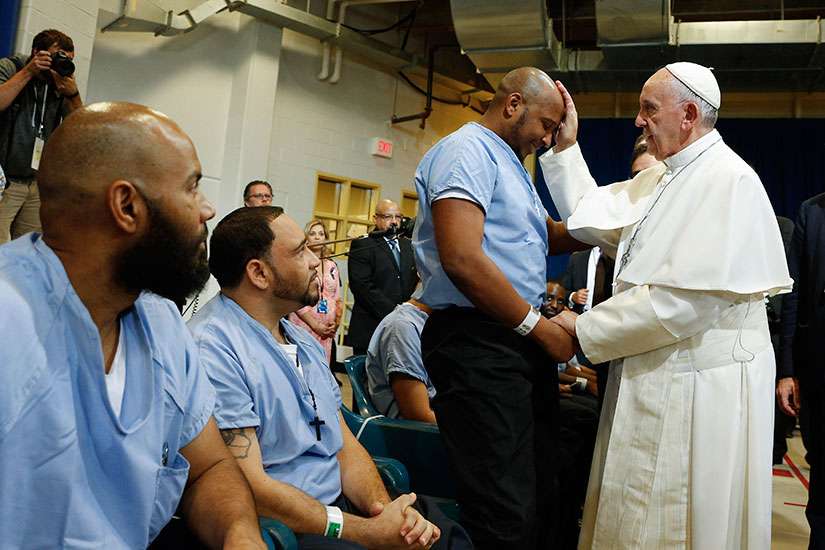In several countries around the world, their justice systems rarely show mercy towards incarcerated offenders. Rehabilitation measures and policies that exist within some justice systems oftentimes do not promote a healthy environment for offenders. In his encyclical Laudato Si’, Pope Francis offers a deeper meaning and broader implications of restorative justice.

Writings such as Laudato Si’ invite people to be responsible about the decisions they make and to base them on their personal experience of faith and civic ethics. Everyone should commit to building a society that is capable of fostering solidarity, coexistence, justice, and peace.
Justice from the Church’s Point of View
As individuals increasingly embrace Jesus’ emphasis on healing and reconciliation, even with their enemies, they are discovering that the type of justice He advocates for is restorative in nature – this means focusing on addressing the wounds caused by wrongdoing and finding ways to heal them. The concept of God’s restorative justice is described in 2 Corinthians 5:16-6:13, while Matthew 18 portrays Jesus as a teacher of this approach to justice.

Another significant narrative illustrating restorative justice is found in John’s Gospel – the account of the woman caught in adultery. In this narrative, the people were following Moses’ teachings, which required stoning such women, but Jesus defused the situation by kneeling down and writing in the sand before challenging them with His distinct words in John 8:1-11, “Let anyone among you who is without sin be the first to throw a stone at her.”
The concept of restorative justice has been addressed in both the Catholic social teaching and the Catechism of the Catholic Church. The Catechism explores the idea of “restoration” in relation to various aspects, such as The Sacrament of Penance and Reconciliation (CCC 1422-1498). It also emphasizes the importance of justice as a virtue for establishing harmony in relationships (CCC 1807).
Additionally, mercy and sin are examined (CCC 1846-1848), along with respect and love for all individuals, even those considered enemies (CCC 1933). Furthermore, there is a discussion on punishment as part of an intended purpose (CCC 2266) and an increasing recognition of the need to abolish the death penalty (CCC 2267). Reflections on the Lord’s Prayer also touch upon these themes (CCC 2838-2845). Despite addressing these various aspects related to restorative justice, there is no specific mention or definition provided for “restorative justice” itself within these texts. Therefore, there is still an opportunity for further development and clarification regarding how individuals can approach justice from a restorative perspective both personally and within society.
Catholic social teaching also emphasizes the concept of “restoration” and refers to “restorative justice”. For example, the Compendium of the Social Doctrine of the Church discusses a society based on “justice and love”, promoting a form of justice that brings about reconciliation
“404. What else is required for an authentic human society?
1886-1889
1895-1896
Authentic human society requires respect for justice, a just hierarchy of values, and the subordination of material and instinctual dimensions to interior and spiritual ones. In particular, where sin has perverted the social climate, it is necessary to call for the conversion of hearts and for the grace of God to obtain social changes that may really serve each person and the whole person. Charity, which requires and makes possible the practice of justice, is the greatest social commandment.”
It also discusses the rejection of the notion that war is a means to achieve justice,
“486. What must be done to avoid war?
2315-2317
2327-2330
Because of the evils and injustices that all war brings with it, we must do everything reasonably possible to avoid it. To this end it is particularly important to avoid: the accumulation and sale of arms which are not regulated by the legitimate authorities; all forms of economic and social injustice; ethnic and religious discrimination; envy, mistrust, pride and the spirit of revenge. Everything done to overcome these and other disorders contributes to building up peace and avoiding war.”
Opening a Space for Dialogue: Restorative Justice in Laudato Si’
Pope Francis presents a different perspective on justice, emphasizing the importance of engaging in dialogue with all individuals. He explicitly expresses his intention for dialogue at the beginning of the document and continues to emphasize this throughout. In contrast to retributive or restorative justice approaches that aim to prove a case against an adversary, the Pontiff advocates for a dialogue-based approach. Rather than viewing the world as a problem that needs solving, he encourages us to see it as something to be contemplated with joy and gratitude. He invites us to engage in deeper reflection and appreciate the opportunity for growth and understanding that conflicts present.

Throughout his document, Pope Francis outlines five specific types of dialogues that he calls upon as actionable steps towards achieving justice. By promoting dialogue instead of confrontation, he hopes to foster greater understanding among people and create positive change. Pope Francis’s approach promotes open communication and seeks mutual understanding between individuals. It encourages embracing conflicts as opportunities for growth rather than seeing them solely as problems or adversarial situations. By entering into meaningful dialogues with others, we can contribute positively towards building a more just society.
In light of these three main lines of thinking that exemplify his inclination towards restoration, restorative justice operates under the belief that,
- Crime primarily infringes upon individuals and relationships rather than solely on the law and state
- Violations create responsibilities more so than feelings of guilt; and
- Justice involves victims, offenders, as well as members of the community in an endeavour to rectify the situation instead of relying solely on state-led blame attribution and punishment.
The primary focus of this perspective lies in addressing the needs of victims while holding offenders accountable for repairing any harm caused. Restorative justice poses fundamental questions such as “who has been harmed?” rather than “which laws have been broken?”; “what are their needs?” instead of “who is responsible?”, and finally “whose obligations are these?” over simply pondering about what someone deserves.
Pope Francis urges us to shift our focus from the transgression of laws and instead concentrate on understanding the obligations that arise from these violations, particularly in terms of relationships. Central to this process of comprehension, referred to as “ecological conversion” (paragraph 219), is surpassing legal frameworks, state violations, and even human rights while still acknowledging their significance. This conversion necessitates a return to our fundamental humanity by recognizing ourselves as God’s gifts, and embracing interconnectedness and interdependence.
“219. Nevertheless, self-improvement on the part of individuals will not by itself remedy the extremely complex situation facing our world today. Isolated individuals can lose their ability and freedom to escape the utilitarian mindset, and end up prey to an unethical consumerism bereft of social or ecological awareness. Social problems must be addressed by community networks and not simply by the sum of individual good deeds. This task “will make such tremendous demands of man that he could never achieve it by individual initiative or even by the united effort of men bred in an individualistic way. The work of dominating the world calls for a union of skills and a unity of achievement that can only grow from quite a different attitude”. The ecological conversion needed to bring about lasting change is also a community conversion.”
By engaging in this transformational journey, we can then wholeheartedly attend to the needs of all parties involved with a steadfast commitment towards achieving the common good. In restorative justice practices, we acknowledge that victims, offenders, and communities each have distinct needs stemming from harm inflicted upon them. The primary focus of learning responsibility lies with offenders who must be held accountable for their actions.
It is crucial to acknowledge that the focus on requirements in this context does not stem from a self-centred perspective centered on personal objectives and desires. Instead, these necessities are profound and align with a dedication to the overall welfare of all individuals and groups involved. By addressing these needs in such a manner, it enables us to gain a clearer understanding of our shared requirements, our interconnectedness, interdependence, as well as our obligations.
Offenders typically require accountability that deals with the negative consequences, promotes understanding and obligation, and changes feelings of guilt. Another requirement for offenders is motivation to undergo personal growth, such as addressing the issues that led to their criminal actions, access to therapy for substance abuse or other issues, and improvement of individual skills. Additionally, offenders need assistance and backing in reintegrating into society.

The community stakeholders require their concerns to be acknowledged as victims, the chance to cultivate a sense of community and shared responsibility, and motivation to fulfill their obligations towards fellow members, including victims and offenders. They also need support in creating conditions that foster the growth of healthy communities. By cultivating a deeper sense of empathy and embracing accountability, we gain a greater understanding that offenders must address the consequences caused by their actions and take steps to prevent similar harms from occurring in the future (paragraph 163),
-
“Although the contemplation of this reality in itself has already shown the need for a change of direction and other courses of action, now we shall try to outline the major paths of dialogue which can help us escape the spiral of self-destruction which currently engulfs us.”
Offenders have a crucial requirement for motivation to undergo a personal change. This process entails addressing the underlying causes of their harmful behavior. Pope Francis expands upon essential elements of restorative justice by emphasizing the importance of repairing damaged relationships rather than simply seeking retribution. In addition to recognizing the needs of all parties involved, a key aspect of addressing and healing the harm is identifying its underlying causes.
Through his teachings, Pope Francis encourages us to work towards restoring relationships and promoting harmony within society. It is worth noting that genuine love towards others should be unconditional – a gift without expecting anything in return. This allows us to love even our enemies (paragraph 228). It is important to note that he is not advocating for specific punishments for offenders; rather, he believes in holding them accountable while also addressing their genuine need for accountability.
-
“Fraternal love can only be gratuitous; it can never be a means of repaying others for what they have done or will do for us. That is why it is possible to love our enemies.”
To conclude, Pope Francis extensively utilizes a restorative justice approach in his work, Laudato Si’. He presents three main concepts to establish the restorative perspective: our identity as human beings, the inherent worth of all living creatures and the entirety of creation itself, and engaging in dialogue with all individuals. Additionally, he addresses key aspects of restorative justice by emphasizing harm as a violation against individuals and interpersonal connections rather than solely laws. He also emphasizes the importance of recognizing obligations and responsibilities through meeting the needs of all parties involved, including stakeholders throughout the process. Lastly, Pope Francis focuses on healing damaged relationships rather than solely determining punishments when it comes to repairing harm caused.













